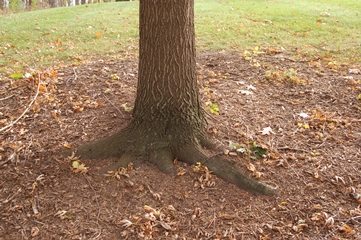Are your Evergreen Trees Stressed?
Written by: Certified Arborist, Ben Reince
Posted: 2021 | Insect Control | Summer
Have you felt stressed in the past year? One way to alleviate stress is to take in the healthy and beautiful trees you have in your yard and getting in touch with nature. We know stress can weaken our bodies and trees are no different. One of the largest stresses for trees is drought conditions that make trees more susceptible to attack by insects.
For evergreens, the Ips sp. Beetles, commonly called Pine Engraver or bark beetles, will take advantage of stressed trees or even healthy trees if the beetle population is high. Ips beetles are known to attack ALL species of pine, spruce, and arborvitae. Ips beetles will colonize a tree and feed in the cambium layer (just under the bark of the tree) preventing the movement of water and nutrients, resulting in dieback or possibly the death of the tree.
Keeping your tree(s) healthy is the best way to prevent Ips as they are less likely to be attacked.
It starts with proper planting and placement of your conifer/evergreens. Try to avoid the following:
- Heavily compacted soils
- Shaded areas
- Soils that retain a lot of moisture
- Overcrowding of plants
Key Ips Beetle Management strategies:
- Reduce or avoid stress with proper watering, mulching, and pruning
- Protect the root systems and reduce temperature and moisture fluctuation with proper use of organic mulches, do not add or pile soil over root areas (the area under the dripline)
- Use root bio stimulants to encourage root growth and nutrient uptake reducing plant stress
- Do not drive or park vehicles over root areas that may damage roots
- Avoid injury to trees from herbicides and other pesticides, carefully read and follow label instructions
- Do not leave pruned conifer/evergreen branches near trees. Beetles can develop in and emerge from the pruned branches and attack the trees
- Remove infested conifer/evergreen trees and promptly dispose of them by chipping or burning
- Protect high-value trees. Insecticides can be used as preventive sprays and should be applied to trunks and larger branches of susceptible trees. With the extended period of activity of Ips beetles, two or three sprays may be needed to protect trees throughout the growing season, when beetle populations are high or when trees are under severe stress.
Help your trees and yourself avoid some stress when deciding what steps to take to prevent or control Ips beetles. Have your Wachtel Tree Science Certified Arborist evaluate the potential options for cultural or chemical controls to keep your trees stress-free.





